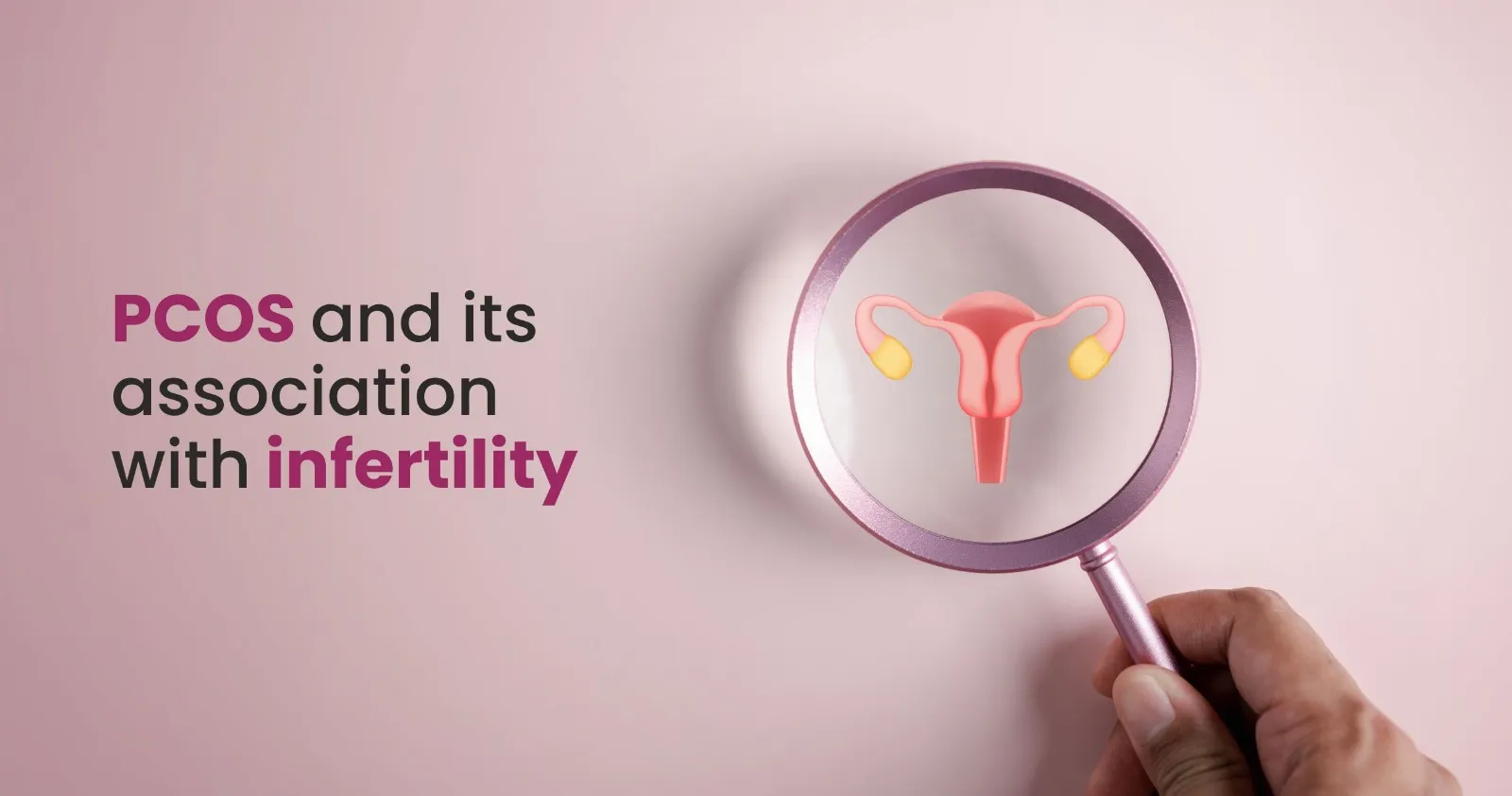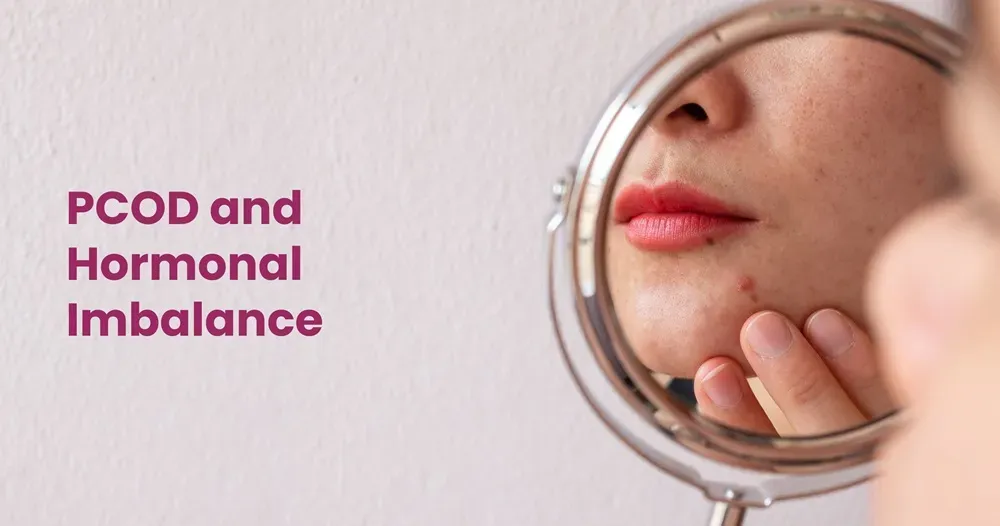PCOS and Its Association with Infertility
Oct 17, 2023

Polycystic Ovary Syndrome (PCOS) is an extremely common hormonal disorder distressing millions of women around the world. Beyond its well-known symptoms like irregular periods and hormonal imbalances, PCOS can have a profound impact on a woman’s fertility, making it a topic of significant concern and interest among women of reproductive age. In this blog, we will explore the causes, risk factors, and when to seek medical attention for PCOS. Whether you're personally affected by PCOS or seeking to understand it better, this information will allow you to make informed decisions about your health and fertility.
Understanding PCOS
Polycystic Ovary Syndrome (PCOS) mainly affects women of reproductive age. PCOS Often leads to irregular ovulation, making it difficult for affected women to conceive. This hormonal disorder affects the hormone balance and potentially leads to irregular periods and difficulty conceiving. Hence, PCCS is frequently termed a common cause of infertility in women. a mixture of the below-mentioned symptoms categorize PCOS:
- Uneven menstrual cycles:Women with PCOS frequently experience irregular or absent menstrual periods, making it problematic to predict ovulation.
- Hyperandrogenism: Elevated levels of male hormones, known as androgens, can lead to symptoms such as excess facial and body hair (hirsutism), acne, and male-pattern baldness.
- Ovulatory dysfunction: PCOS can disrupts the normal ovulation process, making it difficult for women to conceive.
- Polycystic ovaries: On ultrasound, the ovaries of women with PCOS may appear enlarged and contain multiple small follicles, giving them a "polycystic" appearance.
Understanding the complexities of PCOS is the first step towards effective manegement and addressing its impact on fertility. Armed with knowledge, women with PCOS can navigate with greater awareness and seek timely medical guidance for improved reproductive health.
Causes of PCOS
The precise cause of PCOS in women continues to remain unclear, but it is believed to include a combination of genetic and environmental factors. Here are some key factors:
- Insulin resistance
Several women with PCOS experience insulin resistance. It is a condition wherein our body’s cells do not respond efficiently to insulin. This leads to increased insulin production, which can stimulate the ovaries to produce more androgens.
- Hormonal imbalance
PCOS in women is associated with an imbalance in various hormones, including elevated levels of luteinizing hormone (LH) and insulin-like growth factor (IGF-1), which can contribute to ovulatory dysfunction and excess androgen production.
- Genetics
There is a genetic component to PCOS, as it tends to run in families. The exact causes of PCOS in women remain multifactorial, with genetics, hormonal imbalances, and lifestyle factors playing pivotal roles. Understanding these underlying risk factors is essential for both early detection and comprehensive management of this common hormonal disorder.
factors playing pivotal roles. Understanding these underlying risk factors is essential for both early detection and comprehensive management of this common hormonal disorder.
Risk Factors for PCOS
Several risk factors intensify the possibility of developing PCOS, including:
- Family history: A family history of PCOS or related conditions can increase your risk of developing this hormonal disorder.
- obesity: Being overweight or obese is a significant risk factor for PCOS in women. excess body fat can worsen insulin resistance and hormone imbalances.
- Sedentary lifestyle: Lack of physical activity is associated with an increased risk of PCOS.
- Age: PCOS typically develops during the late teens or early twenties, although symptoms may appear at any age.
When to See a Doctor?
If you suspect you have PCOS or are experiencing symptoms such as irregular periods, excessive hair growth, or difficulty getting pregnant, it is essential to consult a healthcare provider. Here are specific situations that warrant medical attention:
- Irregular menstrual cycles: If you consistently have irregular periods, or if your menstrual cycle suddenly changes, consult a doctor to determine the underlying cause.
- Infertility: If you have been trying to conceive for a year without success (or for six months if you are over 35) and suspect PCOS may be a factor, seek fertility evaluation and consultation.
- Symptoms of hyperandrogenism: If you are experiencing symptoms like hirsutism, acne, or male-pattern baldness, a healthcare provider can help diagnose and manage these symptoms.
- Concerns about long-term health: PCOS is associated with an increased risk of other health conditions, such as type 2 diabetes and heart disease. If you have PCOS or are at risk, discussing long-term health management with your Doctor is important.
Summing Up!
Polycystic Ovary Syndrome is a complex hormonal disorder that can impact various aspects of a woman's health, including fertility. While PCOS can present challenges to fertility, it is crucial to remember that many women with PCOS successfully conceive and carry healthy pregnancies with the right medical guidance and support. If you suspect you have PCOS or are experiencing fertility concerns, consult with a healthcare provider to explore your options and create a personalized treatment plan tailored to your needs.
Apollo Diagnostics offers expert diagnosis and guidance for PCOS, helping you understand and manage the condition effectively. Our comprehensive services and experienced team are here to support your journey to better health by providing all the medical tests you require at the comfort of your home. Visit our website today and Apollo Diagnostics experts are here to ensure you get all your tests results at the earliest.
FAQs
1. Can women with PCOS get pregnant?
Yes, many women with PCOS can conceive and have healthy pregnancies. Nevertheless, PCOS can makes becoming pregnant more challenging due to irregular ovulation. If you are trying to conceive and have PCOS, it's essential to work closely with a healthcare provider who can help regulate your menstrual cycle and provide guidance an fertility treatments if needed.
2. What fertility treatments are available for women with PCOS?
Fertility treatments for women with PCOS may include lifestyle modifications, such as weight management, medications like clomiphene citrate to induce ovulation, and assisted reproductive technologies like in vitro fertilization (IVF). The specific treatment plan will depend on individual factors and the severity of PCOS.
3. Does PCOS cause infertility in all women?
No, PCOS does not cause infertility in all women. The degree of fertility impairment can vary significantly among individuals. While some women with PCOS may experience difficulties conceiving, others may not encounter fertility issues at all. Early diagnosis and appropriate management can improve fertility outcomes for many women with PCOS.
Related Blog Post
Blog Categories
- Child Health
- Mens Health
- Women's Health
- Mental Health
- Health Myths & Facts
- Fitness
- Nutrition/Recipes
- Remedies
- Weight Management
- Stress Management
- Health Supplements
- Addiction Management
- Disease Management
- Allergy
- Anemia
- Arthritis
- Asthma
- Autoimmune Diseases
- Blood Pressure
- Cancer
- Deficiencies
- Dengue/Malaria/Chikungunya
- Diabetes
- Eye Problems
- Heart Diseases
- Hepatitis
- HIV/AIDS/STD
- Hormonal Imbalance
- Infection/Flu/Viral
- Kidney
- Liver
- Menstrual Problems
- Pregnancy
- Skin & Hair Problems
- Stomach Ailments
- Thyroid
- Others
- Health Checkups
- Diagnostics/Pathology
- Lifestyle & Wellness
- Covid
- Medical Tests
- Cholesterol
- Health Tips
- Parent Care/Old Age
- Lungs
- Food Intolerance








